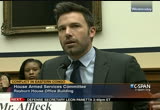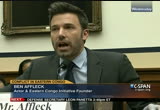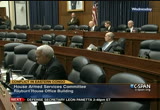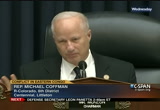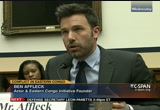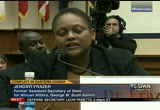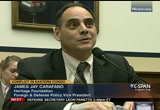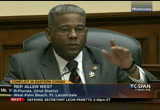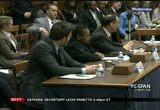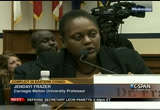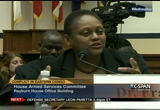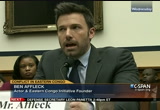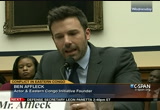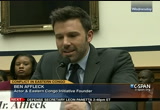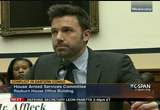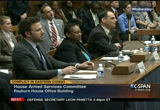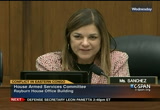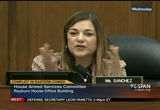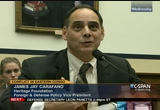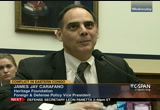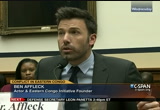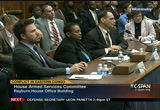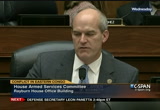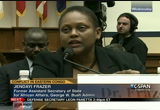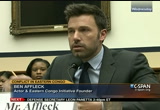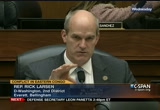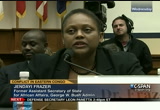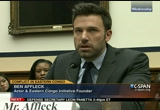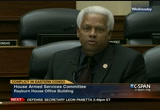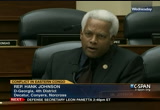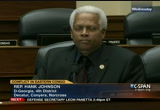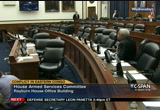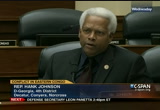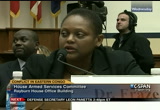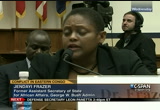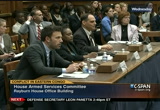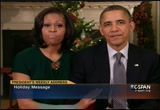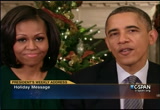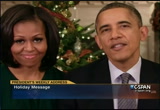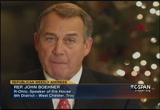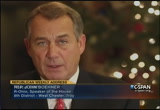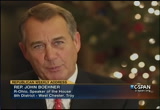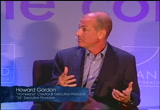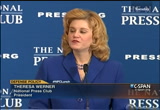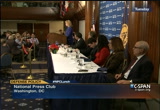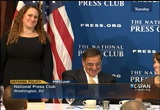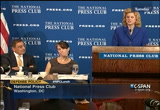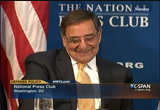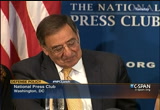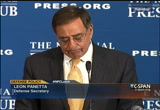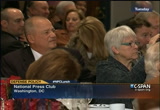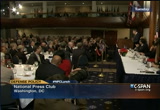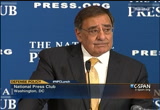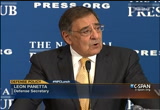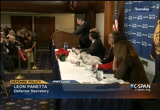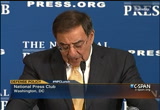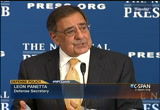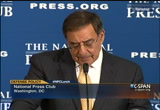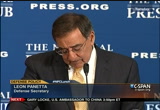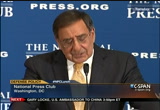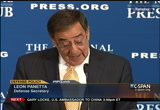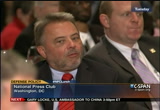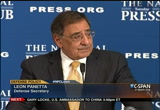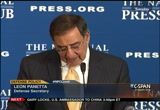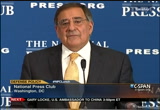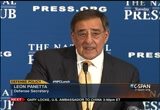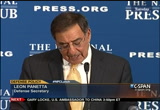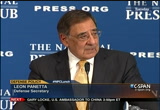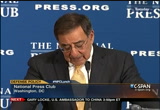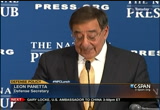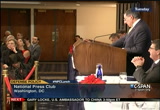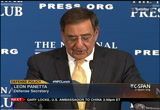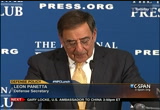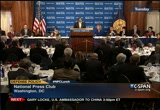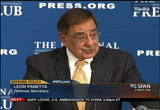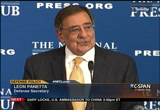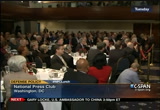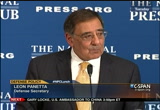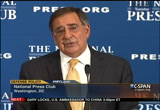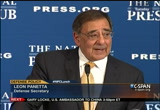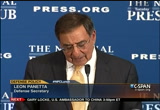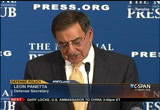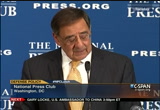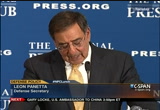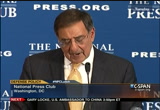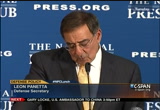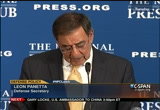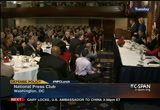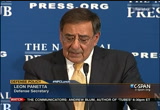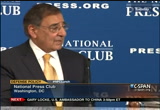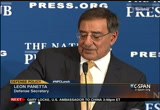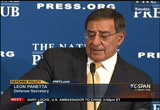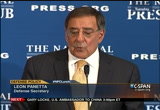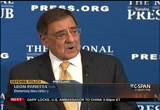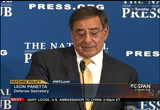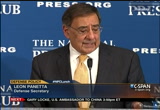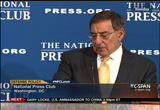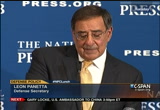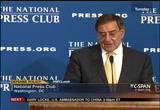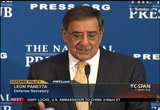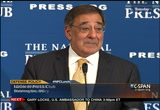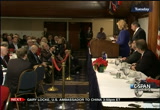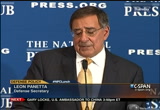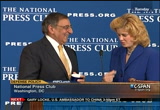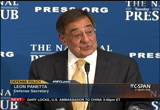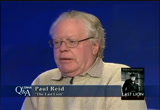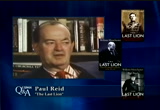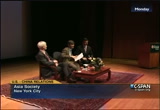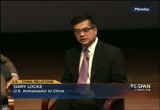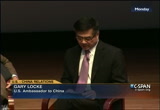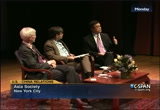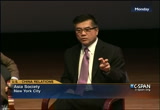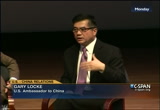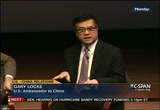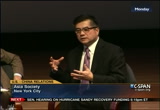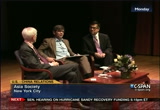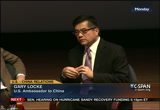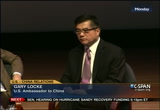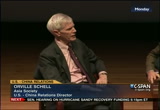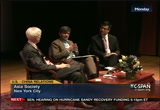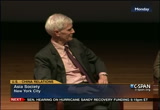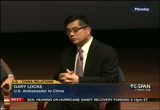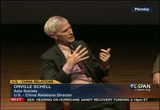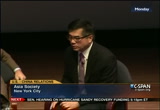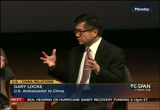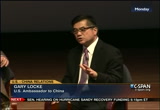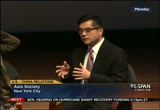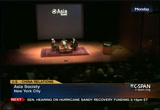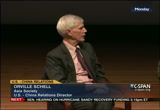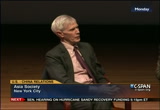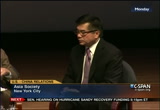tv Washington This Week CSPAN December 22, 2012 2:00pm-4:14pm EST
2:00 pm
hopefulness that i have seen i do believe it is possible to perceive -- prissy legal solutions. we see some of the police we take these signs in, albeit small measurements. will it be easy? are the simple solutions? no. having been on the ground and seen the people there who have a tremendous desire to work -- it is not a pervasive thing where all congolese are corrupt. be fostered and supported -- we
2:01 pm
fostered and supported a corrupt die for national- security reasons. that fostered a culture of corruption -- guy for national- security ppurposes. that fostered a culture of corruption. >> it is one of the most rich countries in minerals and resources. there is a lot potential there for a positive relationship with the u.s. think you, i yield back. >> mr. affleck, i think you have raised a central issue, the lack of security among the population.
2:02 pm
right now we are relying upon congolese government to provide as security. in afghanistan, we've got a questionable partner in the karzai government. that has been difficult. we have a less than credible partner in the congolese government. in afghanistan, we have gone through these stabilization operations as an alternative way to provide security at the local level with the villages, communities, whereby we have been providing some arms and training to the local population there so that they can provide their own security. obviously, the karzai government has been opposed to that. are there any opportunities for any alternative strategies, given the nature of the in theese government any d
2:03 pm
drc, mr. affleck? >> i will yield to an expert fellow panelist year, but one of the -- the basic issue, and one that will go a long way and that i alluded to earlier, climbing some influence to president -- are applying some influence to president kabila so that payment is made to his troops. if there was one stroke of automatically improve people's lives, that would do it. that would take a wholesale step towards improving the security sector. the talk about the security sector as it is this kind of a mammoth thing. if you had paid soldiers who had an incentive to fight, he would not have had a major capital overrun and taken over by 1200 guys.
2:04 pm
that shows you the greed to which the federal government is unable to exert control, even the smallest amount of control in the east. that goes hand in glove with securities sector reform. >> very brief. this working and training local communities for self protection was done in rwanda against the fdlr. i am not so sure about doing this in the congo. it is attractive to me, but i guess i would say it depends on the community. i would say the key here is to engage and embrace the congolese government at the most senior level, but not just the presidential level, which is why
2:05 pm
i keep talking about some kind of by national commission. then you can start penetrating those ministries which have the responsibility, even bring governors over so that you can do at the provincial level. i guess i think that the real heavy lift here is more on the diplomatic side, and working very carefully with the congolese government, which is essentially isolated and does not have much contact with our officials i remember about the army that was not paid -- officials. >> i remember about an army that was not paid. that says an awful lot about the nature and character of society. i think we all agree that if you have a security solution, but does not sit with the situation on the ground, it will simply not work.
2:06 pm
i am very skeptical that the government in kinshasa will ever be a force for good. on the other hand, i agree with mr. affleck and dr. frazer, this is a country of great people. if we can enable them to take control of their own lives, i think we've -- and much more i am much for optimistic. >> i want to try to draw on what i saw in my year in iraq. the two of and what we do, would put the caboose before the engine and then we have the train wreck. we never figure out what comes first. the secure environment, or legitimate governments, or does the individual, military did education and training? -- education and training?
2:07 pm
i agree that you have to start at the provincial and district level. which is the right model to go with here? mr. affleck, you talked about 27 different militia types of groups. when we try to focus on couple, which does not -- kabul, which is not extent beyond the city limits. what has to come first for us to be on the track to success? >> it to get international security assistance peace right and you have african nations, including uganda and rwanda and participate, that gives you some breathing space to move on. that is the essential thing that first. to happen first brok
2:08 pm
>> you have to deal with governments, but obviously creating greater security -- >> governments at which level? "you cannot frankly do real governance of the provisional level with governors unless you're dealing with the capital, because of the nature of the congolese government. you start where you are, and you have monusco, with no real effectiveness, try to bring in units or create a new unit within it that has that capacity. if i were forced to make a choice, and i was dealing at the provincial level, the only force out there right now is monus
2:09 pm
whyco. would try to bring units in the letter actually capable -- monusco. i would try to bring units that are actually capable. i think it is really getting in there and working without putting our forces at real risk that is going to be necessary. i have actually worked with the national government, and it is not as hopeless as it is being presented here. it obviously needs a lot of work, but you deal with to you are dealing with. >> i did not have the honor to serve in the armed forces. i did not have the opportunity
2:10 pm
to go to afghanistan and iraq, so i am speaking from second hand experience. the sense i get is that the united states government and armed forces successfully trained troops in afghanistan and iraq, both under circumstances where they were doing so under hostile circumstances. some folks turned out to be hostile to the united states. there was a situation of violence. what that tells me is that it is doable. it is a doable thing. it was done. i am not suggesting we spend the kind of money -- i am pointing to it, in a much more difficult situation, this goal was achieved. i do not figure to be the united states that steps in and
2:11 pm
reforms the 100,000 plus drc military. i think it is a job for a multinational force. it may be a good job for nato. it is a step that will go the furthest, the quickest in changing the quality of life for people and eliminating the 27 armed groups that you talk about, i find it much more difficult operating in the field there is a force present that they are not equal to. all of a sudden, people are not going to want to take goma. because there is a active state security force. i cannot speak to the exact model of how that would work because i am not qualified to, but i can speak to the fact that it is possible. >> thank you, mr. chairman.
2:12 pm
i yelled back. >> -- yield back. >> think you to all four witnesses for coming today. mr. affleck, you mentioned in your testimony that the coup congolese -- congolese army -- eci has a great impression of that presence of u.s. forces. do you feel like the perception of the u.s. by the people themselves, the co congolese a positive one? >> yes, i do. you have a big country, there a number of different competing opinions about it. i would say that primarily -- i was asked to shoot a film for
2:13 pm
the un. i wanted to a bunch of refugee camps. this was during the fighting, the earlier fighting debt. -- fighting. the was a lot of instability, a lot of fighting. i was walking around with a camera, with my big un badge. i was experiencing a lot of hostility, real resentment to the point that i thought maybe it was not wise for me to be in here. so i took off the u.n. badge. and and people ask me, where are you from. i said, i am america. -- american. all of a sudden, among the people who were really suffering, i was welcome. this is anecdotal. it could be the only place that happened. i did not use this as an opportunity to beat up the u.n.
2:14 pm
-- despite its failings, it does important work. but it did show me that americans were respected. >> your efforts to call on the u.s. and a distraction for special envoy, have those calls been received -- u.s. for special envoy, have those calls been received? >> i have been given the impression that this is under reviewed. it is government-speak that i just learned. >> i will yield the remainder of my time to my colleague, miss sanchez. >> i want to talk to mr. carafano.
2:15 pm
i would like to relate to something that mr. affleck said. he said that we had done a good job with training in iraq and afghanistan. maybe i am the only one on this committee, but i would have to say that this is a disaster for us. in most cases, the work we have done. when we recruit and afghanistan i wouldyear-old,s come -- not hire them here, let alone someone coming from a country where 63 is really old. then we have all those of phantom army people that we have in afghanistan. wheat trade supposedly over 350,000, but when we take account to see who is there, maybe 20% are hanging out there.
2:16 pm
this is a force that we the americans are paying for. the police stations are being paid for by us. when i look a situation like the congo, where they cannot even pay the $40 a month, i think there is a real problem. doctor, tell me the truth is. do you think that you're actually going to go in there or somebody is going to go in there and train these guys are some african group is going to go in there and train these guys -- we're talking about a battalion -- what do you think? usually i am the most optimistic person. on this issue i perceived disaster. >> they're both good and bad
2:17 pm
lessons from iraq and afghanistan. afghanistan is a very good example where at the end of the day we're getting it wrong because we go on too quick a path and we focus on the metric of just getting numbers by certain dates. we were throwing a lot of people out there that do not have the requisite skills and training and capacity to do the kind of things you expect them to do. detroit yourself a little triangle and you say, what is the security situation with my goal here, and how much my willing to spend? , the third point of that frankly is a, what is the realistic capability i deplore the ground that is going to accomplish michael? it is all the question -- "i can deploy on the ground that is my goal? accomplish michael i think it is about this balance
2:18 pm
of having clear, realistic goals for the amount of resources you're willing to commit with. you brought up isr and border security. these are things that are extremely expensive to field. isr is great. the question is, what kind of isr do you want? isr you want is people on the ground you can trust with a cellphone were calling and telling you what is going on in the countryside. it is about as realistic planning. that is a great thing about africom. if it does the training exercises and it does the capacity building that they know how to do, they're going to
2:19 pm
provide -- they're going to help africans provide realistic solutions. heritage was the first foundation to make a credible argument for establishing africom. we want to facilitate solutions within those countries so united states does not get drawn in. if we let africom do its job, we can create sustainable solutions. i really believe that. >> can i add one thing? i think conjuring up afghanistan may have been a mistake because it is associated with intense political feelings that folks may have. my point simply was it that we have done it in the past. we have failed in some ways,
2:20 pm
yes. but we have done it. it is doable in places that are much more difficult and operating -- if it is doable in places that are much more difficult to operate in, it can be done there. >> thank you, mr. affleck. there may be some on this committee who think that we have got the job done in iraq and afghanistan. we do not have that job done. it is going to be very expensive for us, and it continues to be very expensive for us. it is a lot of money. >> >> thank you, mr. chairman. a couple of issues where there seem to be slight differences among the three folks.
2:21 pm
i would like to get elucidation from you all on why you think the way you are thinking. it is mainly defense and training issues. it gets to the difference here between mr. affleck, the training of the second battalion until after there is a commitment from the congolese government to reform, versus dr. frazer's comments and mr. carafano's comments about focusing on the training. maybe it is the mission you think ought to be delayed current the other is the commitment to security reform. perhaps a good start by commenting, do you think we ought to move forward without a commitment to reform?
2:22 pm
mr. affleck, why is it important to you to have that reform first before moving forward? dr. frazer? >> i think we should move 4 right away. -- forward right away. the amount of time that it takes us to actually do a training mission, the lead time that is necessary, interagency work is necessary, it can be a very long time after the decision is made before we are actually doing that training mission. i do not think we should delay. i do not think it is a matter of policy, that we should use this issue, traded italian that can protect civilian lives -- we should not hold that up. -- creating a battalion that can protect civilian lives, we
2:23 pm
should not pull that up. >> i respect and appreciate your position. but it is a small distinction. part of our position revolts around the notion of making sure we're dealing with the partners in good faith. it goes to the issue raised by many congressmen and women here today about, how do we know that we're working with the partners? the idea is to try to take steps down the road, rather than saying, we're going to come in and do this and the status quo can go on. isbassador frazer's point well taken. it is time sensitive think to take people up there to protest
2:24 pm
civilians. i see that as the micro issue. >> second issue, the envoy issue. previous testimony said the demonstration encourages the u.s. security general to appoint a high-level special envoy. should be a u.n. envoy, or should be an envoy with the united states government? is that perhaps -- government? is that a better fit into roby and boarded the heritage foundation.
2:25 pm
-- fit? >> i work for the heritage foundation. you have to bring something to the table. we need to get our strategy together so we are bringing something to the table. i think that might be helpful role if indeed we're bringing the essence of a coherent way to address this. we get excited when it is in the news, and then mr. affleck goes back to hollywood and we ignore it again. >> if you can disclaim heritage -- i have seen them work. senator danforth, worked extremely well. the u.n. has its envoy but is on its brother. if we're going to have a high
2:26 pm
level, it should be a presidential u.s. envoy and they should be able to go into the oval office until the president what they are doing and the president gives the guidance about what they should do. then it can be quite constructive. >> heritage foundation never offered me membership. it is bidding i am on the far left of the panel. -- fink i am on the far left of the panel. -- fitting i am on the far left of the panel. quite think there is a role for both. i believe it should be a high- level envoy. i concur with this idea that envoys are only as effective as their ability or their perceived ability of the very least to access the president of united states. if you're able to do that, i think will find that person can make a huge difference and to warm things up and move policy. a would advocate both. >> thank you, mr. chairman.
2:27 pm
we all have to go home somewhere. as a matter of whether we keep thinking about the things we're working on. >> mr. johnson? >> thank you, mr. chairman. the history of the condo, the belgian congo and all of its up toions from the 1700's the mid-20th-century, characterized by colonialization, european colonialization, extracting the raw materials, minerals, taking them elsewhere to be developed, leaving the nation impoverished.
2:28 pm
then during the 50's and 60's, we have insurgencies that seized power from the colonialists. mobutu comes to power. renames the country zaire, grows corruption. his swiss bank accounts were fatter than many industrialists. $4 billion. he comes to power, he is corrupt, but he is an anti- communist, so he is american postal buddy. when the soviet union falls -- america's buddy. when the soviet union falls, he
2:29 pm
sees us to be useful. meanwhile, kabila seizes power. is a childul, soldier, commander of a group of child soldiers participating in that movement to get rid of him. he is assassinated within hours of the close of the clinton administration back in 2001. his son, 30 years old, former child commander of a child army,
2:30 pm
emerges as the president and he remains in power up to this time. his daddy was supported by the rwandan, angolans, zimbabweania. when he got to power, he told them all, i will be the one who controls the natural resources of this country. after he is assassinated -- what attributes do you attribute to the sun as far as his leadership abilities? joseph kabila, who was recently elected in 2011, which many characterized as a rigged
2:31 pm
election -- what do we know about the current president, and why do we support leaders in africa to exploit their citizens and the poverty that in sue's makes them more susceptible -- ensues makes them more susceptible to extremist elements, like al-qaeda? you will receive 100 virgins when you do the suicide attack, and whatnot. how can we get ourselves out of this, america? somebody talk to me, please. >> i think you are right. this is part of a generation of african leaders that are not
2:32 pm
going to move their countries forward. this is an issue of economic freedom. y have the opportunity,rtunit we're going to keep coming back here. from my perspective, mr. affleck is sitting on the far right, but i am okay with that. [applause] >> to ask the question about the character of joseph kabila -- i first met him in 2001. he came to me with secretary powell, and they sat in the secretary's office soldier to
2:33 pm
soldier. joseph kabila laid out a vision of what he wanted for his government. that was a vision of democratic governance, peace with its neighbors, and economic development for his population. i would say the the entire international community for the very reasons of the history you just laid out brought into this position, which is a long and complicated and dirty history we have all participated in. the point is that joseph kabila , is often underestimated. he is shy in nature. he is visionary. he is leading a huge and complicated country into a second term and may show some wariness of leadership that often comes with trying to move such a big country. -- weariness of leadership that
2:34 pm
often comes with trying to move such a big country. the u.s. government needs to work with him. he is isolated internationally, and it does not help. he is who is. he is where he is. our interests are to try to push him to deliver on that initial vision that he set out with secretary powell. >> would you disagree with that, mr. carafano? >> i guess i am just a pessimist. >> mr. smith? >> mr. chairman, that is fine. i think it'll close our hearing. i want to thank the chairman thank you, members of the
2:35 pm
committee. >> assured. -- adjourned. [captioning performed by national captioning institute] [captions copyright national cable satellite corp. 2012] >> president obama and michelle obama sent christmas wishes to all americans. the family is currently in hawaii for the christmas holiday. john boehner and deliver the republican address. he talked about efforts to reach agreement with the president on the so-called fiscal cliff. >> this weekend as to gather with family and friends, michelle and i wanted to wish you a merry christmas and happy holidays. >> we both love this time of year, and there's nothing quite like celebrating the holidays at the white house. it is an incredible experience, and when we tried to share with as many folks as possible. this month, more than 90,000 people will come through the white house to see the holiday decorations. our theme for this year's holiday season was a joy to all, a reminder to appreciate the
2:36 pm
many joys of the holidays. the joy of giving, the joy of service, and the joy of homecoming. >> this weekend, parents are picking up their kids from college and making room for all the laundry they bring with them. children are counting down the hours until the grandparent's arrive. goggles, aunts, cousins are making their way to join the family ensure in the holiday spirit. >> that is what makes the season so special, and getting to spend time with the people we love the most. >> this year, it is especially true for a are military families. the war in iraq is over. the transition in afghanistan is underway. after a decade of war, our heroes are coming home. all across america, military families are reunited. this week, let's give thanks to our veterans and their families. let's say a prayer for all of our troops, especially those in afghanistan to our spending this holiday season overseas, risking their lives to defend the freedoms that we hold so dear.
2:37 pm
>> , a member, when our men and women in uniform answer the call to serve, their families served right along with them. all across the country, military spouses have been raising their families all alone during those long deployments. let's not forget about our military kids, moving from base to base and school to school, and stepping out to help out at home when mom or dad is a way. our military families sacrifice so much on our behalf. barack and i believe that we should serve them as well as they serve the country. that is why dr. joe biden and i co started joined forces, to honor all our military families. just go to joiningforces.gov. >> that is what the season is all about. it is time to celebrate the birth of christ, reflect on his life, and learn from his
2:38 pm
example. every year we commit to love one another, to give of ourselves, to be our brother's keeper, are sister's keeper. those ideas are not as part of our faith. they're part of all faiths. the unitas as americans. >> in this country, we take care of each other. and in the season of giving, it is inspiring to see so many people all across america taking the time to help those most in need. >> that is part of what makes this such a compassionate nation. this year, many of you are expecting that kind as to families were still picking up the pieces from hurricane sandy. >> thank you for all you have done this year on behalf of your fellow americans to. >> on behalf of my favorite americans, michelle, malia, sasha, mary christmas, everybody. >> happy holidays. >> unless president obama and congress take action, tax rates
2:39 pm
will go on everyone on gingrey first. the day after that, and mandatory sequester will go into effect -- january 1st. the day after that, and mandatory sequester will go into effect. on the 10th of may, we pass legislation that would replace the sequester which irresponsible spending cuts. the events of this past week make clearer than ever that these measures reflect the will of the house. the american people reelected president obama on election day. the also elected a republican majority in the house. they give us all the mandate. not a mandate to raise taxes on families of small businesses, and meant it for us to work together to begin solving the massive debt that threatens our future. the president and senate democrats have vowed to reject an veto all of our proposals
2:40 pm
waffling to offer responsible solutions of their own. -- proposals while failing to offer responsible solutions of their own. instead, he wants more spending and more tax hikes that will hurt our economy. he refuses to challenge the members of his party to deal honestly with the entitlement reform and big issues facing our nation. that is why we find ourselves here today. i have challenged the members of our party to grapple with these issues, make tough choices. washington has a serious spending problem. this was the year, the size of our debt, all $16 trillionths of it, surpass the size of our retientire economy. but president's solution of raising tax rates would hurt jobs, at a time when for too many of our citizens are struggling to find them.
2:41 pm
i have seen the damage that higher taxes can do for jobs and families. i do not want tax rates to go up. republicans do not want tax rates to go up. the best way to address are crippling debt is to make significant spending cuts and fix our tax code, to pave the way for long-term growth and opportunity. this is an approach that most americans approve. we only run the house. democrats continued to run washington. hope springs eternal. we have it in us to come together and do the right thing. will continue to work with our colleagues in congress and the white house on a plan that protects families and small businesses. for now, i wish all the american people a blessed and mary christmas. >> on "newsmakers,"
2:42 pm
representative eliot engel. "newsmakers," sunday at 10:00 a.m. at 6:00 p.m. eastern on c- span. >> it was promoted in certain articles, and there was a completion of politics -- politics. f of the spectrum of political affiliations on the staff were from the far left to the right. there was no agenda. the idea there was an agenda, the charge that was being forwarded but there was a midwife to public policy on course of interrogation -- thereve interrogation,
2:43 pm
was a systemic problem but i suggest that we try to intervene on behalf of those people -- this is a television show. the fact that 24 became a political football it became for a while was a valuable thing. >> monday night it o'clock on c- span, how movies and television portrait politics and policy making. -- 8:00 on c-span, how movies and television portrait politics and policy making.
2:44 pm
>> remarks from defense secretary leon panetta at the national press club. secretary panetta talked about the federal budget, defense cuts and the security situation in afghanistan. he visited afghanistan last week. this is an hour. >> good afternoon. welcome to the national press club. my name is theresa warner and i am the 105th president of the national press club. we are committed to our professions future to our programming and events such as this while fostering a free press worldwide. for more information about the national press club, visit www.press.org. to donate our programs offered
2:45 pm
to the public through our national press club journal them and to do, visit press.org/institute. on behalf of our members worldwide, i would like to welcome our speakers and those of you attending. our head table includes guest of our speaker as well as working journalists who are club members. if you hear applause in our audience, members of the general public are attending so is not necessarily evidence of a lack of journalistic objectivity. i would also like to welcome our c-span audience. you can also follow the action on twitter, using hashtag #npclunch. we will have a q&a and i will ask as many questions as time permits. i ask each of you to stand up briefly as your name is
2:46 pm
2:47 pm
managing editor, army magazine. past president of the national press club and former commander of american legion post no. 20. the incumbent editor in chief, aviation week. the national-security reporter, u.s. news and world report. [applause] 18 months ago, our guests today leon panetta presided as the cia director over one of the most daring operations in the country's history. seal team 6's operation neptune speaker, the rate on osama bin laden to a compound that the pakistan. three days ago, he landed in turkey where he signed an order
2:48 pm
that would sent to patriot missile and troops to the turkish border, a warning to syrian president bashar al- assad to cease the air strikes and fighting against syrian rubbles that has led into turkish territory. we cannot spend a lot of time worrying about whether that pisses off syria, secretary panetta said later. he said he invited kim jong-un for dinner, he served him a glass of wine and tried to find out how he thinks. he is clearly a complex man. his accomplishments over 74 years span two branches of government, education, and a little bit of farm labor on his california ranch. before taking office as the 23rd secretary of defense,
2:49 pm
secretary panetta served more than two years as cia director. after three years, chief of staff to president clinton. he and his wife cut directed the leon and sylvia and the institute at cal state university at monterey bay. to promote public service. he served eight terms in congress. rising to chairman of the house budget committee in 1989. then president clinton's director of the office of management and budget to replaced by me in welcoming to the national press club secretary defense leon panetta. [applause]
2:50 pm
>> thank you very much, theresa, for that kind introduction. thank you for the introduction to be here today. i look forward to the opportunity to go back and pick walnuts back in california. told this story before but it makes the point. when i was young, my father when he first planted that walnut orchard as a group, he would go around and shake each of the branches. my brother and i would be underneath collecting the walnuts. when i got elected to congress, my italian father said you have been well trained to go to washington. because you have been dodging nuts all your life. [laughter] [applause]
2:51 pm
it was great training. i have had the opportunity to be here at the press club in some of my past jobs as a member of congress and as chief of staff. in those jobs, words were my weapon and by shield. in this job as secretary of defense, i have a hell of a lot more going for me. in democracy, words remain our most powerful weapon in our arsenal. it is for that reason is an honor for me to be here at the national press club. i have long had a deep and abiding respect for the washington press corps.
2:52 pm
you play an essential role in making our democracy strong. by holding leaders and institutions accountable to the people they serve. as secretary of defense and in my past jobs, i learned it was important to be accessible to the press and to be transparent with them with regards to the issues and challenges you confront. in this job, i have tried to be as accessible as i can to the pentagon press corps to engage regularly with reporters and to encourage other senior officials in the department to do the same. it is an especially important time to communicate our vision and our priorities as a department. as i have said time and time
2:53 pm
again over this past year, i believe that we are at a strategic turning point. after more than a decade of war, the longest extended period of conflict in the history of the united states. at the beginning of 2012, president obama and the military and civilian leaders of the department came together to publicly release a new defense strategy. it was designed to help the military affectively navigate this turning point and prepare for the future. under that strategy, our goal was to reshape the force of the 21st century. to try to meet the new security challenges that we are
2:54 pm
confronted in this world and try to help the country at the same time reduce the deficits which are confronting. we were handed a number and the budget control act to reduce the defense budget by $487 billion over the next decade. based on my own budget experience at the time, i knew that the approach should be not to simply cut across the board and hollow out of the force. but try to develop a strategy, what is it what the defense department to be not just now but going into the future as well. that is the purpose why we developed the strategy. today i want to describe the
2:55 pm
strategic environment shaping our future. the progress we have made toward implementing the strategy and the risks we face as they work every day to try to keep america safe and secure. before i continue, let me pay tribute to a couple people here who join me at the head table. my deputy secretary plays a crucial role in helping me and dod develop and implement this strategy. i deeply appreciate his dedication and commitment to the department. i also want to pay tribute to my undersecretary for policy who was also here and worked very hard on that strategy to ensure that we develop the right
2:56 pm
strategy for the future. i should also say dempsey and all of the members all participated. in a kind of unprecedented effort to ultimately discuss what were the best steps be could take for the future. one year ago today, soldiers from the first calvary division went out of iraq into kuwait as part of the last convoy of u.s. troops to leave iraq. that war came to an end. last year, we also participated in a complex but successful nato mission that helped bring down gadhafi and give libya back
2:57 pm
to the libyan people. it was a complex operation. when you have that many nations, how to decide targets, who goes after those targets? yet we were able to bring that kind of coordination together and it's certain nato, the united states very well. i think very much a model on how we should approach the future if we have to face that kind of situation again. that is one of the things i'm very proud of over the last four years. is the integration between intelligence and military operations when it comes to going after terrorists. as a result of those operations, we continue to significantly weaken al qaeda's core leadership.
2:58 pm
we are now working to bring the conflict in afghanistan to a successful transition by the end of 2014. last week, i made my trip to afghanistan. i had a chance to sit down with all our military commanders. i went to kandahar had also had the opportunity to meet with afghan leaders as well. all of them believe that we have fundamentally turned in that effort after years in which we lacked the right strategy and necessary resources to strive to achieve the mission we embarked on. we now have a plan in place, indorsed in chicago by nato that has strong international support. we reversed the five-year trend of growing violence.
2:59 pm
the taliban to this day has not been able to regain in the of the territory they lost. we are building afghan security forces that are on track to take the lead for securing the entire country next year. we continue to transition both governance and security to the afghans. 75% of the population has not been transitioned to afghan security and control and next year, we will have 100%. but we have also made clear that our commitment to afghanistan, as we got down by the end of 2014, our commitment will continue. we are transitioning, we are not leaving.
3:00 pm
we are transitioning, we are not leaving. we will maintain an enduring presence aimed at supporting afghan forces and insuring the mission that we were embarked on. the mission that al qaeda never again regains afghanistan as a the united states or our allies. [applause] after more than 10 years of continuous warfare, deployment after deployment, the united states is truly at a critical point. large-scale conflict in iraq and afghanistan with drawing to an end.
3:01 pm
an era of blank check defense spending is over. forces will be reduced and all this occurs as the united states faces an array of threats in the world. even while it is obvious that we do not live in a world where another superpower threat and our military supremacy, it is equally obvious that the threats to our security and global interests are not reseeding as the appeared to do in past wars. coming out of korea, vietnam,
3:02 pm
world war ii, the cold war. today, we still confront these threats in the world. threats that are more complex, more dispersed and in many ways more dangerous. we have made progress against al qaeda's core leaders and its affiliates. we continue to do it in yemen and somalia. al qaeda is seeking a new foothold throughout the middle east. and in countries like mali. it remains determined to attack the united states and remains one of the serious threats we must deal with. north korea, iran, continue to post a proliferation threat and
3:03 pm
are engaged in activities that are destabilizing north east asia and the middle east. the conflict in syria is bringing and violent end to a regime that harbors a large stockpile of chemical and biological weapons. and extremists seek to destabilize a nuclear arms pakistan. increasing military spending by rising powers in the asia- pacific region and turmoil across the middle east in north africa are altering the strategic landscape. at the same time, the nature of military conflict is changing. because of the new technologies
3:04 pm
like cyber and proliferation of missiles, we are seeing potential adversaries, state and non state actors alike acquire more advanced, hybrid and high- end capabilities designed to frustrate the conventional advantages of our armed forces. this means the military services must remain vigilant and strong and appeared to . to operate in a way that differs significantly from the
3:05 pm
past. we will continue to face terrorism and deadly attacks by ied's, but we must also be ready for more capable adversaries to attack our forces and homeland in cyberspace. to attack and launch precision strikes against forward bases, to attempt to cripple our power grid, our financial systems, our government systems. to attempt to deny us freedom of action isometric attacks. as i said, the goals of our new defense strategy is to help shape the force of the 21st century. try to adapt our forces and operating concept said that we are better prepared for an unpredictable and dangerous future. we have been determined to avoid the approach taken in past drawdowns were as i said,
3:06 pm
there were deep across-the-board cuts that hollowed out the force and weakened our military. it left the military demoralized and unready to carry out the missions assigned to it. instead, we have set priorities and made tough decisions to try to build the force of the future and to remain the strong his military power on the face of the earth. the strategy consist of five elements. we have already made progress this year towards implementing that strategy. the first element of the
3:07 pm
strategy is to build a force that will be smaller and leaner. that is a reality. but we must ensure that at the same time, the military is agile, flexible, and technologically advanced. and prepar to deploy as quickly as we can to confront crises in this dangerous world. facing constrained resources and the drawdown of two troop intense of wars, we made a decision to favor a smaller and more ready force over a larger force that would be less well equipped and trained. as a result, army and strength is going to be gradually reduced to 490,000 soldiers over
3:08 pm
these next 5-10 years from a high of about 570,000. the size of the marine corps will also be reduced slightly to about 182,000 from a peak of 202, 000 during the past decade. we are also making investments to be capable of more quickly confronting a wider range of threats across a more dispersed geography. this past february, navy and marine corps conducted their first large-scale amphibious exercise in more than 10 years. in march, the army conducted its first exercise in its new decisive action framing environment that emphasizes combined arms maneuver against a combination of regular and conventional opponents. the second element of our defense strategy is to maintain our force protection where we
3:09 pm
needed. in the middle east and in the asia-pacific region. the asia-pacific region is obviously an area of growing importance to our economy and our security. in the middle east, represent continuing threats to our security as well. even after the withdrawal of troops from iraq. we have maintained a substantial military presence in the middle east. in order to deter aggression. respond to crisis, and short
3:10 pm
regional stability in the face of historic unrest and a continuing threat from iran. last week, i visited some of our troops based in kuwait, part of a robust posture that includes roughly 50,000 troops, dozens of ships, fighters, bombers, advanced intelligence, surveillance, and reconnaissance platforms. we are partnering closely with the gulf states to boost their capacity in critical areas such as missile defense and countermining which will help reduce the pressure to sustain these large deployments over the long term. i also visited an air base in turkey where i announced the deployment of the two u.s. patriot missile batteries as part of the nato effort to try to help protect our turkish allies against the threat of missiles from syria. even as they have asserted are strong and enduring commitment
3:11 pm
to the middle east, we are also renewing and expanding our engagement in the asia-pacific region. the core of our rebalance is modernizing our existing network of alliances and security partnerships throughout the region. and developing new security relations as well. over the past year, we reached a major agreements with japan to realign our forces and to really develop guam as a strategic kabul. -- hub. we have worked to strengthen cooperation with the republic of korea and we began a new marine rotational deployment to australia as well as increased air force cooperation. likewise we are deepening our
3:12 pm
engagement and developing rotational deployment with allies and partners such as singapore and the philippines and expanding our dialogue in exchanges with china. we are also an handed our presence and capabilities in the region. that includes -- expanding our presence and capabilities in the region. that includes allocating our naval fleet to have a 60/40 split between the pacific and atlantic oceans, increasing army and marine presence in the region. locating our most advanced aircraft in the pacific, including new deployments of f- 22's and the mv22's to japan. and lay the groundwork for the first overseas deployment of the f-35 joint strike fighter. the third element of our strategy is that as we do force
3:13 pm
projection in the asia-pacific and middle east, we still have to maintain our global leadership and presence by building innovative partnerships and partner capacity across the globe and using these innovative rotational deployment as a way to do exercises and training with other countries, developing their capabilities so they can provide for their own security. in latin america, africa, europe, and elsewhere. the past decade of war has reinforced the less than that one of the most effective ways to address long-term security challenges is to help build the capabilities of our allies. we have seen its approach with
3:14 pm
our counterinsurgency campaigns in iraq and afghanistan and our counter-terrorism efforts in yemen and somalia. we are expanding our security force assistance to a wider range of partners, in order to address a broader range of security challenges. in the asia-pacific, the middle east, and europe, africa, and latin america 3 to implement this area of strategy, the services are retaining the security cooperation capabilities we have honed over a decade of war and making investments in regional expertise. for example, for the army's new regionally aligned for grade a g brigade structure, they are able to engage on a regionally aligned brigade structure, they are able to engage on a rotational basis. to cut through the bureacracy and red tape to provide assistance. i visited countries recently to
3:15 pm
help advance that growing partnership. also made an effort in a new joint u.s.indian initiative to boost cooperation and trade and streamline our control processes. in order to remain the security partner of choice, the united states must maintain our decisive military edge and adapt to meet in emergency threats. the fourth elements of the new defense strategy is we must always remain capable of being able to confront and defeat aggression from more than one
3:16 pm
adversary at a time, anywhere, anytime. that means if we are engaged in a conflict on the korean peninsula, we must be able to preside -- to both locations. maintaining our ability to simultaneously operate in multiple theaters by investing in critical power projection capability is, our aircraft carrier fleet, our big deck amphibious fleet, a new flow forward staging base and long- range strike capabilities. we are also making investments in the next generation bomber, tanker that will afford our air forces greater mobility and working every day to put our
3:17 pm
joint strike fighter program on a firmer footing. to stay ahead of the growing capabilities of potential adversaries and ensure our ability to quickly defeat depression, we have begun to reexamine our plans to ensure we are prepared for the most realistic scenario for new and unconventional threats and attacks. we are also refining emerging operational, that's -- that will ensure our ability to project in areas where our enemies seek to deny access. this cannot as be about cutting back on defense. we must also be able to invest in the future to protect and prioritize key investments in technology and new
3:18 pm
capabilities, as well as our capacity to grow, adapt and mobilize as needed. to out this strategy review, i made clear this cannot be a budget exercise in deciding where we are going to cut. we have made this decision. we have looked at better efficiencies. we have their reductions in court structure and procurement reforms. we have looked at compensation. all of those areas as part of our budget proposal. if we are to maintain the finest military in the world we have got to invest in prior to missions for the future. despite budget reductions, we
3:19 pm
are standing our fleet of unmanned systems. this is the future. including new carrier launched surveillance and strike aircraft. to boost priority counter- terrorism and build partner capacity efforts, continuing a planned growth in special operations forces which will reach 72,000 by 2017. more than double the number we had on 9/11. we have protected investments in -- an accelerated testing of mobile air systems and ground systems. we are increasing our separate capabilities, including talented manpower.
3:20 pm
developed new rules of engagement in cyberspace. the clarify our mission to defend the nation and enable us cyber threats. we are also protecting our ability to regrow informers by base. if we face a crisis, i have to the last thing i can do is to contact that responsibility out to another country. [applause] the defense strategy and some of the important steps we have taken so far to implement. as a department, we are continuing to refine that strategy and we will continue to do that.
3:21 pm
right now, i see two principal the force. which is still operating at a very high tempo, more than 11 years after september 11. afghanistan. we have been on a crisis posture africa for the past year. and we will continue to maintain a strong presence in that region, even as we rebalance to the asia-pacific area. our outstanding men and women in uniform are the foundation of of everything we do. i've often said we have great weapons, great ships, great bombers, not of that is worth a dam without the u.s. men and women in uniform that
3:22 pm
serve this country. [applause] we need to ensure that service members and their families have the support they have burnt in areas like health and education and employment, when the transition back into their communities so they can be able to go back home and reestablish their ties to their communities. in our budget, we have made a concerted effort to ensure the health of the force, the readiness wright protecting operations, keeping the most flexible weapons platforms. nevertheless, there is pressure on the department to retain access force structure and infrastructure instead of investing in the training and equipment that makes our force agile and flexible and ready.
3:23 pm
aircraft, ships, tanks, basis, even those that have outlived their usefulness, have been natural political constituent. readiness does not. readiness is too often sacrificed in favor of a larger and less effective force. i am determined to avoid that outcome. i have directed that readiness be treated as a strategic imperative for the department and we launched an initiative to assess and approve our readiness across the board. our effort to do everything possible to ensure our ready force also explains why we express concerns about what we saw in the house and senate in 2013 defense authorization bills.
3:24 pm
what they did was in their markups and the bills that passed each of the houses, a converted about $74 billion of what we asked for in savings in our proposed budget to the congress. and it diverted them to other areas that we frankly do not need. final legislation is now being negotiated and we're working. we will work with our partners there to try to improve it. i'm hopeful we will ultimately arrive at a bill that allows us to continue implementing the strategy we have designed affectively. we must make every dollar counts and they must continue to carefully manage the balance, sustaining current operations, being ready to respond to
3:25 pm
crisis and emerging threats, preparing for future operations and investing in the capabilities of the future. balancing these the defectively acquires resources and budget stability. which brings me to another risk, a political system that is depriving the department of the budget certainty we need to plan for the future. for more than a year, this department has the operating under the shadow of sequestration, this mine was mechanism put in place to somehow force the congress to do the right thing. because of political gridlock, this department still faces the possibility of another round of across-the-board cuts totaling almost half a trillion dollars that will inflict lasting damage on our national defense and hurts the very men and women who protect this country.
3:26 pm
wherever i visit our troops, they make clear their concerns about those cuts. what does it mean for them and what does it mean for their families? it is unacceptable to me that men and women put their lives on the line every day in distanced lance and have to worry about whether those here in washington can effectively support them. we are down to the wire. in these next few days, congress needs to make the right decision and to avoid the fiscal disaster that awaits us. my hope is they will do the right thing and that we will achieve a bipartisan consensus on deficit reduction and that trajectory of defense spending in the future. otherwise, we will weaken in this nation in the minds of our
3:27 pm
allies, partners, and our potential adversaries. and undermine the work and sacrifice is that our troops are making every single day. it is easy to get cynical and frustrated. after 40 years, i know my level of cynicism and frustration but my confidence and my hope for the future is restored every time i have the opportunity to visit with our troops on the front lines as i did last week. in them i see the spirit of public service that has kept this country strong for more than two centuries, which has helped us to overcome every period of crisis and diversity in our history.
3:28 pm
that spirit of public service is also evidence that this monument to democracy, the national press club, journalists who commit themselves to pursuing the truth and telling the everyday stories of american people, our public servants in their own right. my last trip, i was honored to be accompanied by an award winning radio reporter for cbs news. three years ago, suffered a terrible injury from an ied attack while covering the war in afghanistan. it was truly an emotional experience to be with her when she returned back to afghanistan for the first time after that injury. she put her own life at risk to tell the story of that war. in her and so many other war correspondents, we see the highest ideal of democracy.
3:29 pm
we will soon unveil a new exhibit outside the pentagon press briefing room to honor those journalists who have died in the line of duty in the last decade of war. alongside the more than 6000 american service members who would pay the ultimate sacrifice on september 11, the journalists died to preserve democracy. they are heroes, all of them, and i know they will remain for ever in our hearts and minds as we continue the hard work of fighting to build a better and safer and more secure future for our children and the united states of america. thank you very much. [applause] [captions copyright national cable satellite corp. 2012] [captioning performed by national captioning institute]
3:30 pm
>> what is your honest position on the attacks of september 11 this year? >> the benghazi attacks, i believe there will be a report coming out tomorrow but a group that will present their view of what took place and where the problems were. my sense is that on that day, when you look at what took place in benghazi, that it is -- as always with these kinds of situations, there is a mix here. but clearly with regards to one of the facilities involved a direct attack on the facility. i think that there is no question that extremists were involved in those attacks. i think we were able to try to
3:31 pm
respond as best we could at the time. we have learned a lot and will continue to learn a lot from that incident. i think it is very important for us. an area where we can respond and respond quickly to make sure that does not happen again. >> have you seen the benghazi arb and the use support the referral of mike vickers? and leaking info to "zero dark thirty" producers? >> i will not comment on that at this time. what was the other question? no, i have not. >> one of the proposed cutbacks west to do away with the service secretary. is this being given serious consideration and if not, why not? >> we obviously continue to
3:32 pm
look at areas where we can achieve efficiencies at the department of defense. there is no question there is duplication. there are clearly areas where we can provide greater efficiencies. we were able, bob gates before me begin that effort. we have added about $60 billion on top of that in terms of further efficiencies. we will continue to review where greater efficiencies can be achieved. i ask that question when i first became secretary. what is the role of the service secretary visa be the service chief? the reality is that there is an important role for them. they are civilians. civilians are involved in
3:33 pm
providing policy in their areas. the also have to negotiate a lot of the politics. so there is an important role for them to play in terms of their particular service. having said that, there are a lot of other places where we can achieve savings in the pentagon and we will. >> at the defense department deals with downsizing services, have you considered cuts to the number of flight in general officers? >> i think that is part and parcel. as you do force reduction, we will be reducing the structure and i think as that happens,
3:34 pm
they have to review not just the reductions in our troops but also the reductions in terms of the command structure as well. this should be part of the review process as we try to achieve savings. >> have you considered making cuts to your staff? [laughter] >> hell yes. [laughter] i don't think there should be anything that is sacrosanct will have to face the kind of budget constrictions be faced. i cut almost half a trillion dollars from the defense budget, the largest number we have cut from the defense budget in the time i worked on budgets. i have been working on budgets for 40 years. to achieve those things, we have to look at every area. one is efficiency.
3:35 pm
you can get some significant savings in a department that large in cutbacks of unnecessary personnel. number 3, procurement reforms. we have a whole area of procurement reforms. the fact is we built weapons systems that continue to be delayed, continue to have cost escalation and added to. the result is by the time these things come out, they have lost their usage because you already gone on to a new technology. we need to strengthen our procurement practices, and we have. we also got rid of the web positioned as not needed. the last area of compensation at the defense department has grown by 80%. i have a health care bill of $50 billion. i cannot do justice for everything i have to maintain in terms of readiness. everything has to be looked at
3:36 pm
if you are serious about trying to achieve the kind of savings we need to achieve to address the budget deficit. >> there are many wounded warriors and our medical system today and the number is growing. what is being done to ensure adequate level of funding remains? >> i have three guidelines when i looked at having to cut billions of dollars. we have to maintain the strongest military in the world. we cannot hollow out of the force. we cannot just crept -- cut across the board. we have to maintain faith with those that have been deployed
3:37 pm
time and time again. we will achieve savings looking at retirement programs. the benefits we have promised those who served, those that have been wounded, i think we need to stand by. so there are no cuts in the programs that serve our wounded warriors. [applause] >> drones are becoming a vital part in warfare. do we have adequate defense against an attack? >> when i talked about unmanned systems, the fact is they are increasing. within the united states, it is one of the leaders in terms of using drone capability and has served as a very well, particularly at the end of the fight against terrorism. we do have to keep track of
3:38 pm
other countries that decide to get into the business. and they are. iran, other countries in the middle east are also beginning to develop the capability. we have got to be able, as they do, to be able to track where those uad's are and take steps to ensure that we can do everything possible to try to make sure they are not capable of surveiling what they are after. that requires a lot of technology and development but it is an area we are focused on to protect ourselves in the future. >> under what conditions do you anticipate further u.s. involvement in syria beyond enforcing the no-fly zone? >> the effort has been an international effort to try to bring as much pressure on syria to get a saw to step down. our primary effort has been dedicated to three areas. number one, try to provide
3:39 pm
humanitarian relief to the large number of refugees in turkey and jordan. we are providing significant humanitarian relief to try to assist those who have tried to escape the terrible tragedy in syria. secondly, try to maintain control over the cbw cites and monitor them to ensure they do not fall into the wrong hands. working with other countries in the region, we are making an effort to monitor the situation and to ensure that does not happen. as a result of that monitoring, we were able to issue a clear warning to syria not to take the step to make use of any of the cbw or there would be serious consequences. we still stand by that statement. thirdly, we are helping the opposition.
3:40 pm
not providing legal assistance but we are providing nonlethal help to the opposition to try to develop their capabilities so that in the event that assad does come down, we will have identified those leaders and provide for a smooth political transition. this will not be easy. it requires a strong international effort to ensure this is headed in the right direction. it would be helpful if russia would participate in the effort to try to ensure there is a smooth political transition. >> the latest report to congress on afghanistan says in search of a tax increase slightly this year at a time when the u.s. still had 20,000 troops on the ground. how can security get better in this afghanistan as those troops leave? >> the reality is that in the time included there, there was a slight increase but the overall numbers, if you look at the entire year, the level of
3:41 pm
violence is down by almost 60% in kabul and in other populated areas. the violence levels are down. the fact is that the afghan army, the afghan police have got a much better at providing security in those areas we have transitioned to. everyone of those major populated areas that have been transitioned is now being secured by the afghan army and police. that is the hope for the future. building up that force is a key for our ability to succeed in this mission for the future. we will continue. the taliban is resilient. they will continue to try to conduct attacks. they will continue to do ied attacks and high-profile assassinations. they will continue to do what
3:42 pm
they can to draw attention to their efforts but overall, they are losers. they have not been able to regain any territory they have lost and we continue to put pressure on them through both the afghans and the u.s. presence there. i think that has been the significant turning point in 2011, for the first time we saw the transition working, the afghan army able to do its job, and violence going down. that continues to be the trend. >> as a former head of the cia, please explain why general petraeus was forced to resign rather than a lesser punishment? >> you have got to be kidding me. [laughter] in this town with that kind of e-mail, do you think he could've survived as director of the cia? i do not think so. >> the pentagon -- why hasn't
3:43 pm
the pentagon taken any steps since this book went on sale in september? >> you know, i think the seals have a commitment. a they're going to write book, they need to pass it by the pentagon. they did not do that. that violates an oath that they took when they became seals. as for the other author, i'm not sure what that was. >> israeli leaders said they may act against iran if they feel like a nuclear program has gone too far. is the u.s. willing to use a financial lever to prevent a unilateral strike?
3:44 pm
>> one thing that the u.s. and israel have kind to an agreement on is a goal in regards to iran. neither country wants iran to develop a nuclear weapon. the united states has made that clear. israel has made that clear. we continue to put pressure on iran. we continue to put diplomatic sanctions on iran and penalize its efforts to develop a nuclear capability. they and the result of that is to push them to the negotiation table and try to solve issues diplomatically. war ought to be the last option and not the first.
3:45 pm
we should exhaust every effort. we are now in that effort. please, make no mistake, if we determine that they have made the decision to proceed with developing a nuclear weapon, the united states considers that to be of red line. >> before get to the last question, i'd like to present you with our traditional mvp coffee mug. and our version of the medallion coin. >> otherwise i will owe you a drink. [laughter] >> ok. we can go upstairs. >> i'm sorry, but i think it was -- who said that he was a golden retriever.
3:46 pm
great dog. great color. when i was at the institute, we used to bring bravo to work with us. he used to come to the office where i was the cia director. bravo sat in on almost all of the meetings involving the operations against bin laden. to this day he has not told a damn soul on what happened. [laughter] [applause] >> thank you for coming today. i would also like to thank the national press club staff for organizing today's event.
3:47 pm
you can find more information about the national press club on our website. if you would like a copy today's event, please check our website at press.org. thank you. we are adjourned. >> if you worked for him, you would get a mercurial, sometimes a generous, sometimes over- bearing, sometimes cool boss -- rule boss, and he did not know how to apologize, which given his age and class, he had a way of turning the tables. his version of an apology would
3:48 pm
be to say you are doing a very good job today. the issue was never settled. he always had to get the last word in. one night, going through white hall, a german bomb fell, and he should not have been out at all. his bodyguard pushed him into a doorway, and a couple of his men were slightly wounded. winston churchill did not like to be touched, and he said "thompson, do not do that. >> thompson said he should not be out there, and he said he is going doing it because he wants and. >> paul reid, sunday night at 8:00 p.m. on c-span's "q&a."
3:49 pm
>> this week, prime minister david cameron announces that 3800 british troops will be withdrawn from afghanistan, discusses the immigration policy and concerns over the national health service spending cuts. "prime minister's questions" a special time, 9:30 p.m. eastern on c-span. now, u.s. ambassador to china gary locke talks to the asia society about u.s.-china relations, joined by orville schell and george stephanopoulos. this is an hour and 25 minutes. >> thank you for coming out on this early hour. for me, this is no late hour. -- this is a late hour. ambassador locke, if you'd like to start.
3:50 pm
>> this is of a treat to be in your presence, having watched you on all the different shows, and also, orville schell, the is a great job in terms of bridging china-u.s., people-to-people exchanges and history. let me just have a couple of comments. first of all, you should know that the people in china are riveted by the tragedy of newtown, connecticut, and people in china feel very deeply about it, and their thoughts are with the families as well. just within the last weeks, we have undergone and seen major political events both in the united states and china. obviously, the reelection of president obama here, and also
3:51 pm
the unveiling of a new group of leaders in china. both aspects speak to continuity and change. we will head the new secretary of state, and if we are to believe the press reports it will be senator john kerry. the overriding thing that i want to impress upon people is there will be continuity in the u.s.- china relationship, because for quite some time the leaders of both countries have been committed to greater engagement with each other, and really working very hard at developing a mutually beneficial, constructive relationship and one with cooperation. the reason is that so much of the world's economy is in the asia-pacific arena.
3:52 pm
60% of the world's gdp is in the asia-pacific region, and we are so economically intertwined as two countries. asia, china, is the number two exporting destination for the united states, number one outside of north america. it is our agricultural destination. we used to go back and forth with canada, but now it is china, and this year they are 40% higher than they were one year ago. our exports of all goods and services to china have grown by 50% in just the last two years, almost double the rate of exports to the rest of the world. almost 1 million u.s. jobs depend on the exports of goods and services to china, and at the same time millions of jobs in china dependent exports of
3:53 pm
chinese-made products to the united states, so all economies are intertwined, and american and chinese leaders know that. so, we have to figure out how we can get along, not only because of our own economic self interest, but because the history of the asia-pacific region will be written by the united states and china, and as i told the students upstairs and to so many people as ambassador, so many of the problems facing the world will only be solved with the united states and china collaborating together. some of the issues cannot be solved by just the united states or china and they will require the active participation of both, and the world is looking for leadership from both. we have to get this
3:54 pm
relationship right. rhetoric alone will not work. you have to be able to demonstrate cooperation that brings real results for real people in both countries and, indeed, the world, but i think we are off to a great start if you look at where we are today compared to where we were 40 years ago when nixon first when to china. we are coming to the end of the celebration of 40 years between relations between the united states and china since nixon's historic visit. so much has transpired during that time. there will be ups and downs, but if you look to the overall trajectory, we are closer, which so much more into dependency. >> you started on the theme of continuity, so that means you
3:55 pm
are staying on as ambassador? >> as far as i know. i will leave it to abc news to break the story. >> i think it is a safe bet, but let's talk about the other transition you mentioned, the ascension of the xi jinping to leadership. you have met him i will ask the obvious question, what is he really like to the extent that you could tell? >> he is very much more at ease in public and with people. he has already come out with several pronouncements, saying he would reduce the red tape -- excuse me, pomp and circumstance around meetings we did not so many floral arrangements, -- not so many
3:56 pm
floral arrangements, keep your meetings short -- and he talks fondly of his visit to america. his time in iowa when he was a county official, he paid a lot of attention to the families that he was visiting and ask them probing questions about their daily lives. i remember he was asking one of the wives of the farmers, do you feel isolated, so far away from shopping malls and things like that? he was asking about technical aspects of the combined that he was inspecting, and in fact he repaid the hospitality one year ago in iowa, inviting all of the people that he had stayed with
3:57 pm
to china and paid for their way. >> you have studied and worked with every chinese leader since mao. how is he different? >> what is so interesting about the situation now is there was once a premium on a leader been a big leaguer with clear policies and acted boldly with a public persona. now there is a different kind of leadership. the reason we do not know more about xi jinping is because it does not serve well in the present scheme of things to demonstrate to much of an individual perspective. >> what do you know about this period before he became the leader, where he disappeared? is that all on the level?
3:58 pm
>> we do not know much, and ambassador, you might know more than the rest of us. >> you were there at the time. what could you tell? >> they said he had a physical ailment, but the first reports were that the chinese government was upset with the united states, and he refused to meet with hillary clinton, but actually he had to cancel meetings with many other countries, close allies of china, for about 10 days. he then did meet with secretary leon panetta and joked about the rumors concerning his absence. from what we could see, it does seem to be a physical ailment. >> i wonder what this feels like when you are the ambassador, and
3:59 pm
you have these big stories again "the new york times" and also bloomberg that talk about the .ealth of xi jinping's family what happens when a story like that breaks, and is there any way the u.s. government had a hand in it? >> often times, they do think the u.s. government has a hand in these stories, and we always indicate that our press is free and come up with stories that even we do not like, but we have a basic philosophy of the freedom of the press, and we are not going to put pressure on any news organization from writing stories to disseminating opinions and conducting the investigative journalism. >> did it create any kind of
4:00 pm
ripple throughout the country? >> it did not create a ripple throughout china because it was censored. the "new york times" articles were not available. no references on >> at a time where we know that there is a growing quality in china, there must be some sense throughout china that the leaders are enriching themselves. >> the way it has worked until of least present day, and the reason that these articles about ewalth wealth --la wealfamily not him, his larger family -- there is a growing sensitivity to the fact some government officials can and to enrich themselves.
4:01 pm
-- do enrich themselves. it is okay to do it on a lower level, but when it gets up very high -- it is at this point that leadership begins to get in the mood to control things in a resolute way. if there is one thing that have come out against in this new leadership, it is corruption. xi jinping said if we do not get control of corruption, it will be the end of the state and the party. they're well aware it is going on. still, they do not shine kindly on press reports about what is going on in the region. >> he has had some tough talk about how china has to be battle ready. >> just a week and a half ago,
4:02 pm
he was following in the steps of 1992. he also went to meet with some military commanders. here he was a little more muscular and nationalist. he said, we have to have a strong military. we have to guard our sovereignty. this rattled a few cages in southeast asia and japan. they're obvious points of contention in the islands. i still do not know who we think this man is. there will still be a lot of pieces missing. >> much does that matter to the united states? >> -- how much does that matter to the united states? >> a lot.
4:03 pm
it is important for us, important for the world economy, also important for china. we do not have a great sense of the policies of xi jinping because china is ruled by a committee of seven. he may be the future president, the new head of the communist party, head of the military right now, but he has got to develop a consensus among the other members of the group of seven. he may be the leader of the group of seven, but he has got to get their support. he has got to develop that coalition. it may take him awhile to consolidate his alliances and figure out where he can move and at what pace. we really will not know for a wild exactly how fast, how far
4:04 pm
he is going to move and what areas he will emphasize. >> as his leadership team is , youg together, you wrote described the elite as being almost a fearful, whispering. what is going on? >> in a society which does not reveal itself very readily in terms of policy, people have concerns. there was a concern in beijing as we had up to the 18th congress that a history, it. of amazing economic growth -- a period of amazing economic growth, some new strategy and some new act, that was going to be the responsibility of the new
4:05 pm
leaders -- and nobody knew what was going to be. >> not a fear that the ascent would stop. >> no, but they have had years of astounding growth. if there's anything we know about economies, it is that ultimately they do this. of course there is anxiety. how long can you keep this going? is that is what the leaders are trying to figure out. >> it must of made your job quite difficult, because china was public enemy number one. how much of the pullback came on u.n. how would you respond -- u.n., and how would you respond? >> if mitt romney were elected,
4:06 pm
he would surely call china is towards a manipulator and his first day and follow through to the commerce department, which adjudicates a lot of these trade completes -- >> were they afraid of that? >> i think they were nervous. at the same time that they know the candidates for president have made harsh statements about china before, during the course of the presidential campaign. they are aware that to all the different administrations over the last 40 years, the relationship has gotten better and there has been some constancy to the relationship. all the administrations have subscribed to the basic tenets of the u.s.-china policy. >> as there following the was quite ait
4:07 pm
close election. the leaders you engage with every day, what was their sense of what was happening in who they would be dealing with? >> they understood this was a matter of politics, and china has been politicized in every presidential election. there were many people that would be coming to visit china, people previously in government, people they respected who deplore some of the statements and rhetoric of the campaign and assure that was the campaign is over, the relationship will be restored. >> and that has generally been right? >> if you look of the course of u.s.-china relations over the last 40 years, it has been fairly even and constant. think the chinese
4:08 pm
have gained a greater sophistication about understanding the oddities of the american political process? >> i think so. but we still have to assure them, resassure them that we have an independent judiciary, and when members of congress are speaking it is not necessarily reflect the views of the administration. >> have you explain this a pivot to asia by president obama? >> we explain it as a natural development, as american forces drawdown in the middle east from iraq and afghanistan. we have been preoccupied, necessarily so, over the last several years in the middle east.
4:09 pm
as we start to pull down, we are naturally going to be looking at the areas that we have in some ways ignored or overlooked. and we also mention that we're not trying to contain china. this pivot includes greater engagement with china. president obama has met with president hu jintao 12 or 14 times. secretary of state hillary clinton has been to china seven times. it is a recognition of the importance of the entire asia- pacific region, not as militarily, but economically. -- just militarily, but economically. the engagement with all of asia is important because we have always been a pacific power. our presence in the pacific
4:10 pm
region goes back to the 1800's. we have not really ever left china. we are now just winding down of our involvements in the middle east, and are now able to devote more attention to an area that we have always had an interest in. >> is it your sense that is to talk to the chinese that they buy it? >> the are concerned. it does excite a lot of the old cold war thinking. i think what they mostly fear is that somehow they will be contained, there is some kind of a big plan to in circle. this brings back memories of when china was very isolated during the cold war. there is a whole new generation
4:11 pm
of people who have a much more sophisticated understanding, but that i would say is a very strong sort of autonomic response to the united states beefing up its forces. the wake up one morning and burma has flipped on them -- burma seemed eternal in being their faithful ally, it suddenly changed. these things because consternation. these things happening around them excite this. >> how much does having liberal democrats come to power in japan except that? >> that is probably the most problematic issue. -- excite that?
4:12 pm
>> that is probably the most problematic issue. japan has not played it probably as well as they could have. it serves china's purpose is to have something happening outside its borders which can rally the people at home. there is a lot of complex things going on in age of these reactions to foreign movements -- each of these reactions to foreign movements. >> the north koreans surprising had given some reports that there were able to pull off the long-range missile test in china. what was going on behind the scenes? >> we have been communicating with the chinese about the need to try to dissuade north korea from launching that missile.
4:13 pm
they say it is for a satellite into outer space, but it is using the same technology that would be used to launch a nuclear warhead. this type of missile technology is expressly covered under several united nations security council resolutions prohibiting such testing of missiles and that type of technology. it is supported by china, even. in the spring, when china tried to launch a satellite but failed using this technology, china said we needed to come up with a presidential statement from the u.n., condemning the actions of north korea would set the stage for tougher actions in the future if north korea were to launch another missile. that missile has been launched. we now think it is time for
196 Views
IN COLLECTIONS
CSPAN Television Archive
Television Archive  Television Archive News Search Service
Television Archive News Search Service 
Uploaded by TV Archive on

 Live Music Archive
Live Music Archive Librivox Free Audio
Librivox Free Audio Metropolitan Museum
Metropolitan Museum Cleveland Museum of Art
Cleveland Museum of Art Internet Arcade
Internet Arcade Console Living Room
Console Living Room Books to Borrow
Books to Borrow Open Library
Open Library TV News
TV News Understanding 9/11
Understanding 9/11